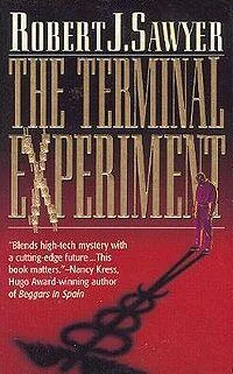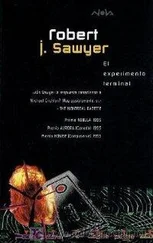Robert Sawyer - The Terminal Experiment
Здесь есть возможность читать онлайн «Robert Sawyer - The Terminal Experiment» весь текст электронной книги совершенно бесплатно (целиком полную версию без сокращений). В некоторых случаях можно слушать аудио, скачать через торрент в формате fb2 и присутствует краткое содержание. Год выпуска: 1995, ISBN: 1995, Издательство: Harper Prism, Жанр: Фантастика и фэнтези, на английском языке. Описание произведения, (предисловие) а так же отзывы посетителей доступны на портале библиотеки ЛибКат.
- Название:The Terminal Experiment
- Автор:
- Издательство:Harper Prism
- Жанр:
- Год:1995
- ISBN:0-06-105310-4
- Рейтинг книги:5 / 5. Голосов: 1
-
Избранное:Добавить в избранное
- Отзывы:
-
Ваша оценка:
- 100
- 1
- 2
- 3
- 4
- 5
The Terminal Experiment: краткое содержание, описание и аннотация
Предлагаем к чтению аннотацию, описание, краткое содержание или предисловие (зависит от того, что написал сам автор книги «The Terminal Experiment»). Если вы не нашли необходимую информацию о книге — напишите в комментариях, мы постараемся отыскать её.
magazine in the mid-December 1994 to March 1995 issues, under the name
, before its first novel publication in May, 1995.
Won Nebula Award for Best Novel in 1995.
Nominated for Hugo Award for Best Novel in 1996.
The Terminal Experiment — читать онлайн бесплатно полную книгу (весь текст) целиком
Ниже представлен текст книги, разбитый по страницам. Система сохранения места последней прочитанной страницы, позволяет с удобством читать онлайн бесплатно книгу «The Terminal Experiment», без необходимости каждый раз заново искать на чём Вы остановились. Поставьте закладку, и сможете в любой момент перейти на страницу, на которой закончили чтение.
Интервал:
Закладка:
The program set to work. It was a much smaller search — only one term — and a much narrower area to search — only four computers instead of the hundred or more that Philo was currently examining. With luck, it would make all the substitutions before it was too late…
The console beeped, signaling its task was complete. Jorgenson was back, having found nothing of interest in the scanning room. He looked at the screen, then at Sandra. Thirteen hits for Hobson. Sandra pointed at the tally. “Display them in context,” she said.
Two appearances of the word in an online dictionary entry for “Hobson’s choice.”
A user-ID file, equating “fobson” with Peter G. Hobson.
A computerized Rolodex with home and business addresses for Peter Hobson.
And nine more references, mostly within copyright notices, to Hobson Monitoring Ltd. as parts of various pieces of scanning software.
“Nada,” said Jorgenson.
“He’s got an account here,” said Sandra, turning to Sarkar.
“Who does?” he said.
“Peter Hobson.”
“Oh, yes. We use some programs made by his company.”
“Nothing more?”
“Well, he’s a friend of mine, too. That’s why I have his home address in my Rolodex.” Sarkar looked innocent. “What were you expecting to find?”
CHAPTER 41
Cathy Hobson was exhausted. It had been a long day at the office, slogging away at the Tourism Ontario account. She’d stopped at Miracle Food Mart on the way home, but the idiot in front of her had decided to unload all his change on the cashier. Some people, Cathy thought, should be forced to use debit cards.
When she finally arrived at home, she pressed her thumb against the FILE scanner, leaning on it as if it were the only thing keeping her from collapsing to the ground. The green LED atop the scanner winked at her, the dead bolt sprang back, and the heavy door slid aside. She entered her house. The door closed behind her and the lock snicked back into place.
“Lights,” she said.
Nothing happened. She cleared her throat and tried again. “Lights.”
Still nothing. She sighed, set down her shopping bags, and groped for the manual switch. She found it, but still the lights did not go on.
Cathy made her way up into the living room. She could see the glowing LEDs on the VCR, so it wasn’t a power failure; the entryway bulb was probably just burnt out. She said “lights” once more, but the three ceramic table lamps — lamps that Cathy herself had made — remained dark.
Cathy shook her head. Peter was constantly fiddling with the house controls, and it always took a while to get things working properly again.
She lowered herself to the couch, spreading her aching feet out in front of her. Such a long day. She closed her eyes, enjoying the darkness. After a moment, remembering her groceries, she hauled herself up and headed down to the entryway. She tried both the light switch and saying the word “lights” again. Still nothing. She was about to bend over and pick up the bags when she noticed the phone sitting on the little table in the hall. The large red light adjacent to its keypad was on. She moved closer. The visual display said “Line in use.” The phone hadn’t rung.
And Peter wouldn’t be home for hours yet; he had a board meeting tonight at North York General.
Unless … “Peter!” Her shout echoed slightly in the corridor. “Peter, are you home?”
No reply. She picked up the handset and heard a high-pitched whine. A modem.
She looked at the visual display again. “Private caller” — an incoming call, but whoever was using the modem had requested suppression of Call Display.
Jesus Christ , she thought. A sim .
She slammed the handset down, then picked it up again, jiggling the hook switch rapidly, trying to make enough line noise to sever the connection.
It didn’t do any good. Peter, of course, had the finest in error-correcting modems, and the sim apparently had equally good hardware.
She moved quickly to the front door and pressed the UNLOCK button next to it. Nothing happened. She grabbed the manual handle. The door refused to budge. She hit the “In Case of Fire” override. The door was still jammed. She slid open the hall closet — it, at least, had no locking mechanism — and looked at the door control panel. An LED was glowing like a drop of blood next to the phrase “thwarting break-in.” Normally the doors would instantly unlock in case of a fire, but the smoke detectors denied that there was a fire, and some other detector said someone was trying to break in from outside. Cathy left the closet and looked through the peephole in the front door. No one was there. Of course.
She was trying to remain calm. There were other doors, but the master panel showed them all to be in anti-break-in mode as well. She could try going through a window, but they were all locked, too, and the glass was, of course, the best modern safety glass money could buy.
The word she’d been fighting not to think finally pushed to the surface of her consciousness.
Trapped.
Trapped in her own home.
She thought about trying to trigger the smoke detectors, but, of course, neither she nor Peter smoked, so there were no lighters anywhere in the house. And Peter didn’t like the smell of matches or candles, so there were none of those either. Still, she could set fire to some paper on the stove. That might set off the alarms, unlocking the doors.
She hurried to the kitchen, taking care not to trip in the darkness. The moment she entered, though, she knew she was in trouble. The digital clocks on both the microwave and the regular oven were off. The kitchen power had been cut. There was a rechargeable flashlight plugged into a wall outlet. She pulled it out of the socket. It was supposed to come on automatically when the power went off, but it was dead. Cathy realized that the power must have been off in the kitchen for many hours, and so the flashlight had depleted its charge. But — that whine. The refrigerator was still on. She opened its door and a light went on inside. She felt the rush of cold air on her face.
The sim knew exactly what it was doing: the VCR and the fridge were still on, but the stove and the outlet that recharged the flashlight were off. As was typical in a smart house, every outlet was on its own circuit and fuse.
She made her way into the dining room and held on to the back of a chair for support. She tried to remain calm — calm, dammit! She thought about getting a kitchen knife, but that was pointless — there was no physical intruder. The control box for the house systems was in the basement, and that’s where the phone cables entered, too — power and telecommunication lines were being systematically buried in response to fears that unshielded overhead lines caused cancer.
Cathy inched toward the top of the stairs that led to the basement. She opened the door. It was pitch black down there; for their fifth anniversary, Peter and Cathy had treated themselves to a home-theater system, so the blinds on the basement windows had been replaced with Mylar-lined curtains on electric rails — and the curtains had been drawn. Cathy thought she knew the layout well enough to find the incoming phone line even in the dark. She stepped onto the top stair—
The overhead sprinklers came on. No alarm — nothing to summon neighbors or the fire department. But cold water started showering down from the ceiling. Cathy gasped and ran back up into the living room. The sprinklers shut off behind her and came on in there. She moved onto the stairs leading up to the bedrooms. The sprinklers cut off in the living room and went on in the stairwell.
Cathy realized that they were following her — the sim had presumably keyed into the motion sensors that were part of the burglar-alarm system. Through the mist, she could see that the LEDs on the VCR were now off — presumably to avoid starting a fire by electrical shorting.
Читать дальшеИнтервал:
Закладка:
Похожие книги на «The Terminal Experiment»
Представляем Вашему вниманию похожие книги на «The Terminal Experiment» списком для выбора. Мы отобрали схожую по названию и смыслу литературу в надежде предоставить читателям больше вариантов отыскать новые, интересные, ещё непрочитанные произведения.
Обсуждение, отзывы о книге «The Terminal Experiment» и просто собственные мнения читателей. Оставьте ваши комментарии, напишите, что Вы думаете о произведении, его смысле или главных героях. Укажите что конкретно понравилось, а что нет, и почему Вы так считаете.








